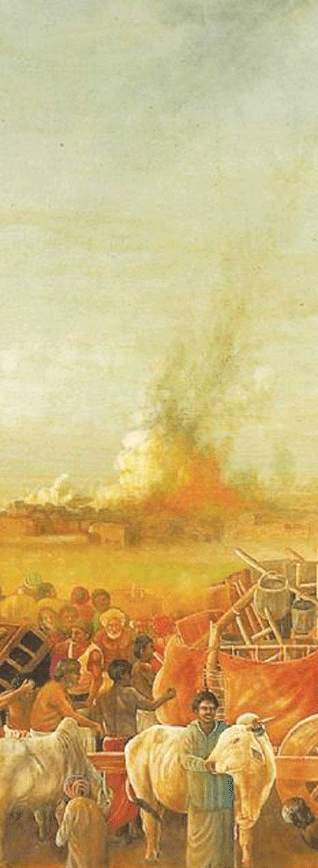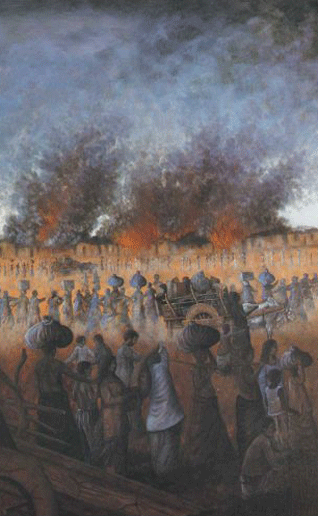Partition
Why Are There No Memorials To The Partition of Punjab, India?
by GEETA PANDEY
Over the years, I have seen many films and read several books on the Nazi Holocaust, but they still did not prepare me for a visit to the Yad Vashem museum in Jerusalem, Israel, where the real horrors of the genocide come alive.
On the walls are photos of large, happy Jewish families - with grandparents, parents, assorted uncles and aunts and children - torn apart by the Nazis for not conforming to its notions of racial purity.
There are images from the concentration camps where Jews were sent to be gassed or shot in thousands.
There is even a bit of the rail track which was used to transport the unfortunate victims to their deaths.
But the most harrowing are the personal testimonies of some of the survivors - the shocking tales of what they witnessed and went through.
'Gut-wrenching'
Nearly two million people visit Yad Vashem every year and many of the visitors today - including several of my colleagues, all of them hardened journalists - come out of the museum sobbing.
One described it as "gut-wrenching".
Another said she knew "Hitler was a bad guy", but never realised the enormity of "his evil".
During our visit, we met Shlomo Balsam, an educator at Yad Vashem.
Mr. Balsam told us he had lost 44 members of his family during the Holocaust.
He showed us a photo of his uncle's family. "They were all killed by the Nazis," he said.
He then pointed to a little boy in the picture: "That's my cousin, Shlomo. He was killed too. When I was born, my parents named me after him."
Mr. Balsam gave us a glimpse of his past - a tiny scrap of cloth, a black-and-white photograph.
We asked him if having a memorial like Yad Vashem was a good idea - would it not be better to forgive and forget, to bury the ghosts of the past and move on?
"It's important to have a remembrance memorial, so that such horrors are never repeated," Mr. Balsam answered.
'So much suffering'
In 1947, a few years after the end of World War II, at least one million Sikhs, Hindus and Muslims were killed in communal violence that broke out as the Indian subcontinent was divided by the British empire into India and the newly-created state of Pakistan.
The Partition saw the largest mass migration in human history of some 10 million people. About a million people were left homeless.
However, there is no memorial to the memory of the victims, either in India, Pakistan or what is now Bangladesh. A small privately-built peace memorial does exist on the Indian side of the Wagah border, but it is not much to write home about.
"There was so much suffering... But how many people know about it?" asks 89-year-old Subhadra Butalia. "A memorial will help people remember," she says.
The Partition tore apart Mrs. Butalia's family. As she made the journey from Lahore - now in Pakistan - to Delhi (India), she was separated from her brother and mother, who stayed behind.
"I never saw my mother again. She died there," she adds.
And what she did see, she does not like to remember: "In Delhi, trains pulled in at the railway station, full of bodies. The platforms were full of bodies heaped upon each other. There was blood everywhere."
I ask her the question I earlier asked Mr. Balsam - is it not better to forgive and forget?
"What should we forgive and forget?" she responds sharply. "Who do you want to forgive? It has happened and cannot be changed.
"People know there is evil. But when they see it, it makes an impact."
'Counter-productive'
Over the years, there have been small campaigns - mostly online - in support of a Partition memorial, but they have all been unsuccessful.
The British historian and author William Dalrymple, who lives outside Delhi, says memorials can sometimes "be counter-productive because they get caught in nationalistic jingoism".
A "totally apolitical" memorial would be fine, he says.
"But it is unlikely that a museum in India would have any resemblance to one built in Pakistan.
"I can see huge disagreements - and it can get into very dangerous territory."
The historian, Ramachandra Guha, says the Partition was "indeed a colossal tragedy", but between India and Pakistan there are no "straightforward victims and perpetrators".
Also, he says, the location of a memorial is important.
"What's the point of having a Holocaust museum in Jerusalem?" he asks. "The new Holocaust museum in Berlin is a better one. It serves its purpose, because the Germans were the perpetrators."
The ideal outcome, he says, would be the construction of a museum in Delhi to "commemorate the butchery of Muslims", and another in Lahore to "commemorate the butchery of Sikhs and Hindus".
"That would be a great idea," he says. Indeed it would be.
[Courtesy: BBC]
August 16, 2010
Conversation about this article
1: Kanwarjeet Singh (Franklin Park, New Jersey, U.S.A.), August 18, 2010, 7:55 AM.
There are two major reasons why people in power do not and will not allow such memorials: a) They do not care about the past - hence many a time when dictators come into power they will make sure all memorials erected by past leaders are destroyed; b) Most importantly: when people in power are themselves responsible for a genocide they cannot let that be a memory for future generations. Can we imagine Hitler building a memorial to Nazi brutality or Stalin erecting one for his mass murders! Similiarly, Nehru, Gandhi, the British and Jinnah (in descending order) were responsible for millions of lives lost due to their ego and lust of power. Do you think their future generations who are still "ruling" India will allow or care for a memorial to be built? As far as people are concerned, India takes the bottom place in their "concern for other people/ history" list.
2: Jamil Mirza (Lahore, Punjab, Pakistan), November 04, 2010, 11:10 PM.
After 63 years of independence, the Government of Punjab, Pakistan, is building a memorial in Walton, Lahore.
3: Ranvir (Montreal, Quebec, Canada), February 07, 2011, 9:46 PM.
If something has to be done, the inspiration must come from within. You don't wait for an outside force to do it for you or take the initiative. If Ranjha, Shiri Frahad, Terry Fox or a number of such other individuals could move mountains, why can't we. Are we just lions by name, not by action? Are we any lesser than the wiser and resourceful Jewish nation? Is our pain or compassion any less?
4: Rishi Raj (Boulder, Colorado, U.S.A.), January 15, 2012, 2:27 PM.
I wish to help to build such a memorial. How can I help ... what should I do?





